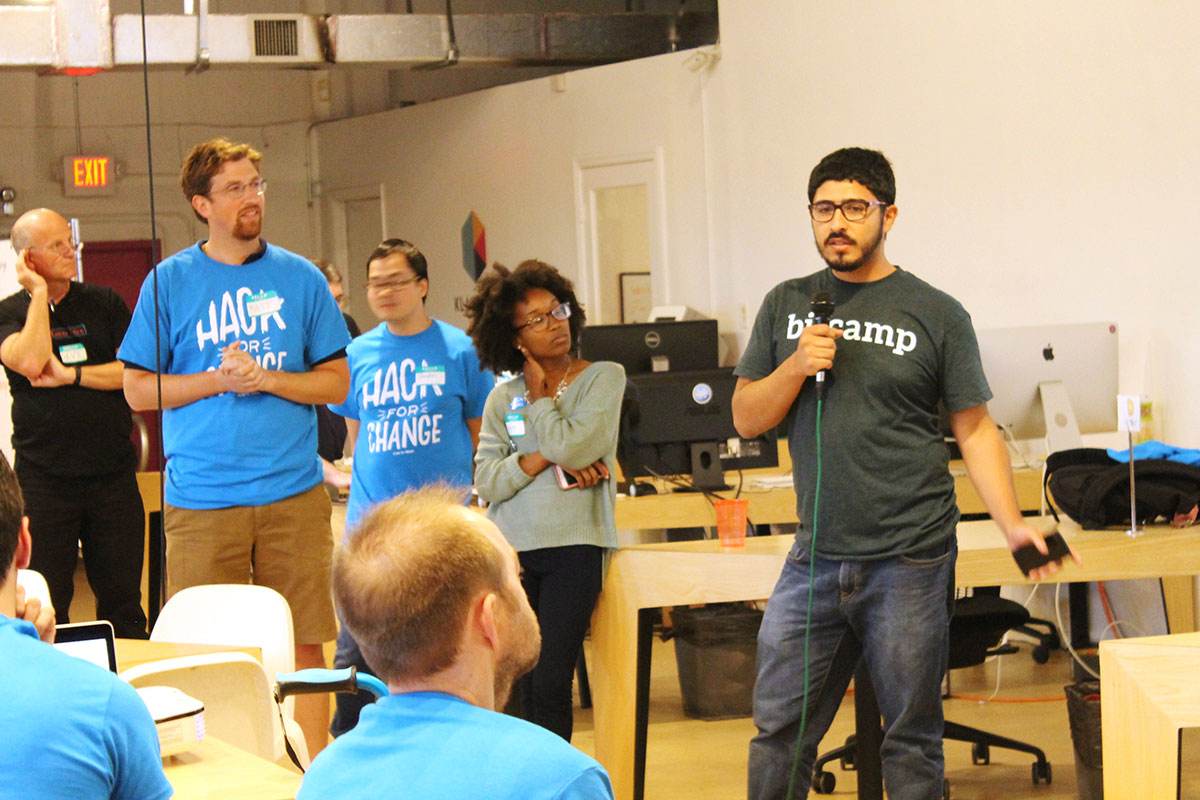
Miami community develops ideas to help citizens better connect with government

Photo: A civic hacker who worked on the public transportation challenge at Miami’s National Day of Civic Hacking event takes input and questions from other hackers on his project. Credit: Paige Levin.
If a hurricane struck this instant, would you know where to find shelter?
On June 6, Miami civic hackers dealt with that problem by developing a text messaging system designed to help people get information about shelters in Miami-Dade County. It was one of many projects developed at Miami’s third annual National Day of Civic Hacking event.
This year’s theme: principles for 21st century government.
“Our elected leaders get it,” said Rebekah Monson, co-captain of Code for Miami. “They understand that we want to work with them, and we want to make this place better.”
Knight Foundation sponsored Miami’s Day of Civic Hacking at The Lab Miami for the third year in a row; Web developers, designers, students and officials from the Florida Department of Financial Services came together to rethink civic issues.
Florida Chief Financial Officer Jeff Atwater kicked off the hackathon with a statewide challenge on state vendor data.
“Taxpayers should demand accountability from their government, and I’ve worked hard to present Florida’s financial information in a way that allows Floridians to become an auditing team of 19 million,” Atwater said. “Florida is full of innovators and technology-focused entrepreneurs, and it’s vital that we harness their talent and excitement for community involvement.”
The challenge was one of five at the event encouraging the collaborative use of open government data and technology to solve civic problems. Others included climate change, public transportation, disaster preparation and open data policy.
Miami’s Civic Hacking Day was just one part of a national event. Thousands of people in over 100 cities throughout the country participated in the 21 different challenges offered, according to hackforchange.org. National Day of Civic Hacking was organized by Code for America, SecondMuse and NASA.
By the end of the day, the Miami teams had worked on ideas for services allowing users to find more information about public transportation, government dollars and Miami water quality.
Each idea met a wave of positive responses – even those that did not fully work.
“Our goal in doing these hackathons is not really to make finished product technology,” Monson said. “It’s to get people to work together and show what’s possible.”
Now, Code for Miami has 10 starting ideas it can push forward, she said.
Damon Davison, a member of the disaster preparation team, said he was happy to see his team’s finished product. After creating a shelter information system for Miami-Dade County, they began developing one for Broward County.
“A lot of us really feel like the community is what you make of it, and so by participating in the community and making things better, we actually create things and kind of earn our right to be here as Floridians,” he said.
Next, Code for Miami will try to get the county to pass an open data policy.
“We’re starting to have meetings with our elected officials and with staff at the county to talk about what open data policy means and what we as citizens would like to see,” Monson said. “They’re very engaged thus far, and we’d like to make sure that’s protected for years to come.”
She said she is proud of what civic hackers in Miami have accomplished, but government technology still has to get better.
“We’re sort of building community, and that’s what it’s going to take to really push Miami to its next phase of existence,” she said.
Paige Levin is a journalism intern for the Knight Foundation. Email her at [email protected] and follow her on Twitter @PaigeLevin.
Recent Content
-
Community Impactarticle ·
-
Community Impactarticle ·
-
Community Impactarticle ·


